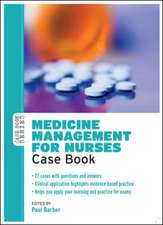Pharmacology for Nurses
Autor Michael Adams, Norman Holland, Carol Urbanen Limba Engleză Paperback – 2 apr 2019
Preț: 855.19 lei
Preț vechi: 900.21 lei
-5% Nou
Puncte Express: 1283
Preț estimativ în valută:
163.64€ • 171.31$ • 135.40£
163.64€ • 171.31$ • 135.40£
Carte disponibilă
Livrare economică 17-31 martie
Livrare express 01-07 martie pentru 76.26 lei
Preluare comenzi: 021 569.72.76
Specificații
ISBN-13: 9780135218334
ISBN-10: 0135218330
Pagini: 960
Dimensiuni: 217 x 277 x 34 mm
Greutate: 1.68 kg
Ediția:6th edition
Editura: Pearson Education
ISBN-10: 0135218330
Pagini: 960
Dimensiuni: 217 x 277 x 34 mm
Greutate: 1.68 kg
Ediția:6th edition
Editura: Pearson Education
Notă biografică
Michael Patrick Adams, PhD, is an accomplished educator, author, and national speaker. The National Institute for Staff and Organizational Development in Austin, Texas, named Dr. Adams a Master Teacher. He has published two other textbooks with Pearson Publishing: Core Concepts in Pharmacology and Pharmacology: Connections to Nursing Practice. Dr. Adams obtained his master's degree in pharmacology from Michigan State University and his doctorate in education from the University of South Florida. Dr. Adams was on the faculty of Lansing Community College and St. Petersburg College, and served as Dean of Health Professions at Pasco-Hernando State College for 15 years. He is currently Adjunct Professor of Biological Sciences at Pasco-Hernando State College and Hillsborough Community College. Leland Norman Holland, Jr. PhD (Norm), over 25 years ago, started out like many scientists, planning for a career in basic science research. He was quickly drawn to the field of teaching in higher medical education, where he has spent most of his career. Among the areas where he has been particularly effective are preparatory programs in nursing, medicine, dentistry, pharmacy, and allied health. Dr. Holland is both a professor and supporter in nursing education nationwide. He brings to the profession a depth of knowledge in biology, chemistry, and medically related subjects such as microbiology, biological chemistry, and pharmacology. Dr. Holland's doctoral degree is in medical pharmacology. He is very much dedicated to the success of students and their preparation for careers in health care. He continues to motivate students in the lifelong pursuit of learning. Carol Quam Urban, PhD, RN, Associate Professor, is Director of the School of Nursing and Associate Dean for Practice and Strategic Initiatives in the College of Health and Human Services at George Mason University in Fairfax, Virginia. She has been on the faculty at Mason and considers the study of pharmacology to be a course that truly integrates nursing knowledge, skills, and interdisciplinary teamwork. She credits her students, past and present, for providing a never-ending source of real-world stories that make learning about pharmacology enjoyable in class. She has also published the Pearson textbook Pharmacology: Connections to Nursing Practice with Dr. Adams.
Cuprins
UNIT 1: CORE CONCEPTS IN PHARMACOLOGY 1. Introduction to Pharmacology 2. Drug Approval and Regulation 3. Principles of Drug Administration 4. Pharmacokinetics 5. Pharmacodynamics UNIT 2: PHARMACOLOGY AND THE NURSE-PATIENT RELATIONSHIP 6. The Nursing Process in Pharmacology 7. Medication Errors and Risk Reduction 8. Drug Administration Throughout the Lifespan 9. Individual Variations in Drug Response 10. The Role of Complementary and Alternative Therapies in Pharmacology 11. Emergency Preparedness and Poisonings UNIT 3: THE NERVOUS SYSTEM 12. Cholinergic Drugs Affecting the Autonomic Nervous System 13. Adrenergic Drugs Affecting the Autonomic Nervous System 14. Drugs for Anxiety and Insomnia 15. Drugs for Seizures 16. Drugs for Emotional, Mood, and Behavioral Disorders 17. Drugs for Psychoses 18. Drugs for the Control of Pain 19. Drugs for Local and General Anesthesia 20. Drugs for Degenerative Diseases of the Nervous System 21. Drugs for Neuromuscular Disorders 22. Substance Abuse UNIT 4: THE CARDIOVASCULAR AND URINARY SYSTEMS 23. Drugs for Lipid Disorders 24. Diuretic Therapy and Drugs for Renal Failure 25. Drugs for Fluid Balance, Electrolyte, and Acid--Base Disorders 26. Drugs for Hypertension 27. Drugs for Heart Failure 28. Drugs for Angina Pectoris and Myocardial Infarction 29. Drugs for Shock 30. Drugs for Dysrhythmias 31. Drugs for Coagulation Disorders 32. Drugs for Hematopoietic Disorders UNIT 5: THE IMMUNE SYSTEM 33. Drugs for Inflammation and Fever 34. Drugs for Immune System Modulation 35. Drugs for Bacterial Infections 36. Drugs for Fungal, Protozoan, and Helminthic Infections 37. Drugs for Viral Infections 38. Drugs for Neoplasia UNIT 6: THE RESPIRATORY SYSTEM 39. Drugs for Allergic Rhinitis and the Common Cold 40. Drugs for Asthma and Other Pulmonary Disorders UNIT 7: THE GASTROINTESTINAL SYSTEM 41. Drugs for Peptic Ulcer Disease 42. Drugs for Bowel Disorders and Other Gastrointestinal Conditions 43. Drugs for Nutritional Disorders UNIT 8: THE ENDOCRINE SYSTEM 44. Drugs for Pituitary, Thyroid, and Adrenal Disorders 45. Drugs for Diabetes Mellitus 46. Drugs for Disorders and Conditions of the Female Reproductive System 47. Drugs for Disorders and Conditions of the Male Reproductive System UNIT 9: THE INTEGUMENTARY SYSTEM, EYES, AND EARS 48. Drugs for Bone and Joint Disorders 49. Drugs for Skin Disorders 50. Drugs for Eye and Ear Disorders Appendices A. Answers B. Institute for Safe Medication Practices (ISMP): ISMP's List of Error-Prone Abbreviations, Symbols, and Dose Designations C. Institute for Safe Medication Practices (ISMP): ISMP List of High-Alert Medications in Acute Care Settings D. Calculating Dosages








